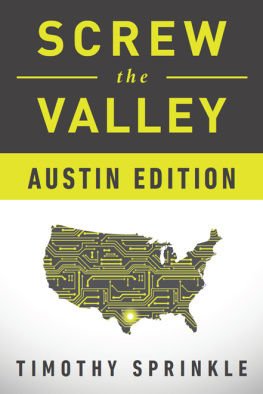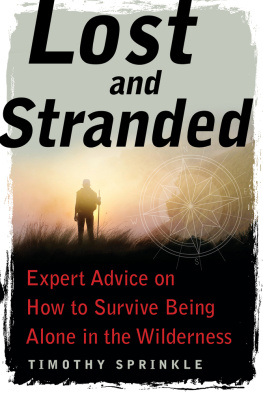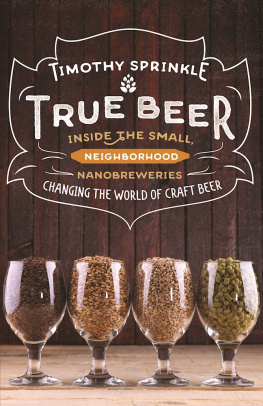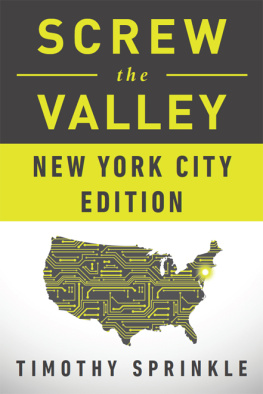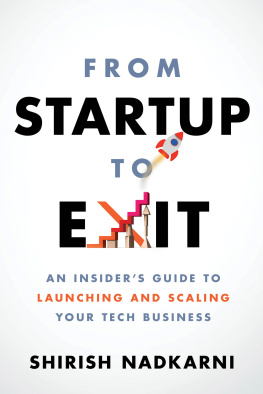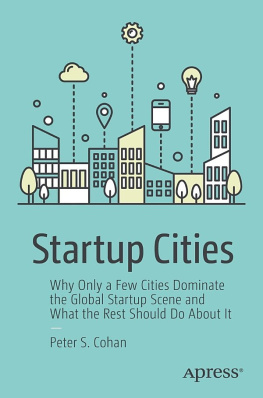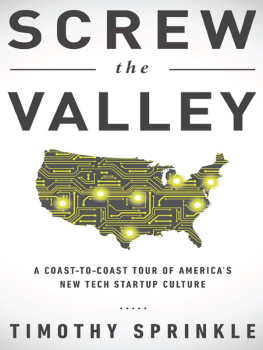Copyright 2015 by Tim Sprinkle
All rights reserved. No part of this book may be used or reproduced in any manner whatsoever without written permission except in the case of brief quotations embodied in critical articles or reviews.

BenBella Books, Inc.
10300 N. Central Expressway
Suite #530
Dallas, TX 75231
www.benbellabooks.com
Send feedback to feedback@benbellabooks.com
First E-Book Edition: June 2015
e-ISBN: 978-1-941631-93-5
Editing by Erin Kelley
Cover art and design by Pete Garceau
Text design by Publishers Design and Production Services, Inc.
Text composition by Aaron Edmiston
Distributed by Perseus Distribution
www.perseusdistribution.com
To place orders through Perseus Distribution:
Tel: (800) 343-4499
Fax: (800) 351-5073
E-mail: orderentry@perseusbooks.com
Significant discounts for bulk sales are available. Please contact Glenn Yeffeth at glenn@benbellabooks.com or (214) 750-3628.
Contents
To learn more about Austin and other great startup cities around the country, purchase Screw the Valley: A Coast-to-Coast Tour of Americas New Tech Startup Culture http://screwthevalley.com/
I T ALL STARTED with the dean.
Before Dr. George Kozmetsky became the dean of what is now the McCombs School of Business at the University of Texas at Austin (UT), he was a technology entrepreneur, cofounding global conglomerate Teledyne with Harry Singleton in 1960 and the IC2 Institute think tank in the late seventies. He later served as a mentor to both Michael Dell and National Instruments founder Dr. James Truchard. Former president Bill Clinton awarded Kozmetsky the National Medal of Technology in 1993.
But back home in Austin, Texas, he is probably best remembered for his unique weekly schedule.
For years, Dr. Kozmetsky held office hours for his students every Friday morning at 5:00 a.m., when the print edition of the Wall Street Journal was delivered. During those sessions, Kozmetsky would go over the business news of the day with his students, sharing with them his thoughts on the economy at large, as well as career advice, business strategies, and any other topics that came up in the hour-long discussions. For the students, it was a cant-miss appointment.
I had the good fortune of having Dr. Kozmetsky as an MBA professor at UT, so he was kind of the guy who seeded the whole venture capital and technology idea into my head, remembers Austin-based venture capitalist Rudy Garza. And it was pretty humbling, you know? He had built this $60-billion company and he would let any student come meet with him. You could just go. Any of his class students, any MBA student, could go and visit with him and talk about any topic. I was just fascinated. So I took advantage of that and became a regular participant in those regular 5:00 a.m. Friday meetings.
Garza is far from alone in this experience. Kozmetsky is something of a local legend in Austin, a name that comes up in conversation with entrepreneurs and business leaders all over town, especially if theyve been working in the area for more than a few years.
Take John Harkey Jr., the CEO of Houston-based Consolidated Restaurant Companies Operations and an 83 UT graduate, for example. In a 2013 profile in the McCombs School alumni magazine, McCombs Today, Harkey mentioned the role that Dr. Kozmetsky had played in his own business education. He would say, Meet me at five in the morning, Harkey told the magazine. So, I would be up at 5:00 a.m. banging on the deans office window [to be let in]. He was just a great visionary; he really kicked off the beginning of the preeminence of the UT business school.
Jason Seats, the current director of TechStars Austin accelerator program, calls Kozmetsky the guy who pushed the rock down the hill to get the Austin technology community up to critical mass. Many of the young students and campus leaders he mentored back in his UT days are still in town, Seats tells me, working on startups, investing in new technologies, and leading many of the tech companies in the area. They are the citys founding generation of entrepreneurs and tech investors.
When I met with Seats at the TechStars Austin office in Downtown Austin, he shared a story with me about a man he had met shortly after arriving in the city in mid-2013. He was a crumpled-up old man that Seats ended up sitting next to at a Chamber of Commerce dinner. Not surprisingly, this old-timer was right there with Dr. Kozmetsky in those early days, too, stopping by the office in the predawn hours along with a long line of students and well-wishers every Friday morning, all coming to get business advice from the oracle of Austin. Everyone from timid undergrads to the governor of Texas made their way through that office during his tenure at the McCombs School, which extended from 1966 through 1982.
Dr. Kozmetsky died in 2003, but his impact on the Austin-area tech ecosystem remains as vital as ever. At his memorial service, UT president Larry Faulkner called Kozmetsky an innovative pioneer, citing his vision and creativity when it came to both business matters and education. He was the father of Austins entrepreneurial spirit and a prominent presence in the business community worldwide, Faulkner said. His accomplishments reflected brightly on this city and helped to place Austins name on the global register. Whenever I travel throughout the nation and overseas, I discover that business leaders are keenly aware of George Kozmetsky and what he has achieved here.
In fact, many speak to me with reverence about what George had done for them personally.
Chances are he would not be surprised at all by what the Austin-area technology scene has become.
Not to put too fine of a point on it, but Austin is perhaps the most active and most successful small city for tech entrepreneurship in the country.
According to a 2013 report compiled by Praxis Strategy Group, the AustinRound RockSan Marcos, Texas, metro area has generated more jobs in technology fields than any other region in the county since 2001, including the Bay Area. Tech employment in Austin was up 41 percent in that time, and the number of local workers in STEM fields (science, technology, engineering, and math) is up 17 percent. Austin also ranked first in the country in all of these same areas between 2010 and 2013.
The capital city of Texas also tends to do well in terms of both venture capital investment and angel funding, ranking in the top ten nationally in both and generally outperforming similarly sized smaller markets. The citys population was about 842,000 as of 2012.
None of this is an accident, says Julie Huls, president of the Austin Technology Council, explaining that the technology sector currently supports about 26 percent of the jobs in Austin, accounts for some 110,000 local workers, and contributes $21 billion in direct value to the regional economy annually. Tech employment in the area is expected to increase by 9 percent by 2017, adding about 9,000 new jobs, and one out of every five new tech jobs in Texas in that time is expected to be in Austin.
I think weve been fortunate that we have a super-friendly business climate. Huls tells me in her office about fifteen minutes outside of Downtown Austin. And obviously tech is enjoying that, but there are other industries that are enjoying that as well. That pro-business reputation is spreading beyond Texas. Huls says she takes at least one phone call every week from people in New York and California who want to know more about doing business in the area because theyre thinking about moving to Texas to start a company. Thats in addition to the business owners who reach out to her when planning a corporate move to the state. Dell is headquartered in the nearby suburb of Round Rock, and organic grocery chain Whole Foods was founded in the city in 1980 and maintains its headquarters and flagship store on Sixth Street downtown. I think that everyone outside of Austin understands that Austin is different, Huls says. So we have a lot of people coming in. And then we have a lot of executives that have been here for fifteen or twenty years and have had a series of companies and successes, and they just like living in Austin so theyve stayed around.
Next page
